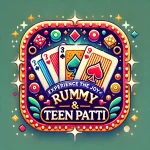Description
From Origins to Advanced Techniques: The Complete Guide to Rummy Rummy is a card game that has been played for centuries & has a rich and varied history that dates back to ancient civilizations. Many historians think that Rummy developed from earlier card games played in China in the 19th century, despite the fact that its exact origins are unknown. It is believed that the game was inspired by the Chinese card game “Kong,” which involved combining cards to form runs & sets. Rummy traveled to Europe, where it experienced major changes as trade routes grew & cultures converged. Gin Rummy and Indian Rummy are two of the many variations of Rummy that have emerged since the game’s popularity in the United States by the early 20th century. Rummy developed a wide variety of variations as it spread throughout the world, adapting to regional tastes and customs.
Because of its straightforward rules and quick-paced gameplay, Gin Rummy gained a lot of popularity in the US in the 1930s. In India, however, the game developed into a distinctive variant that added skill and strategy components, which made it a player favorite. Rummy entered the digital era with the advent of online gaming in the late 20th and early 21st centuries, which enabled players to interact and compete from all over the world. Despite maintaining its fundamental ideas of strategy and social interaction, rummy has evolved into more than just a game in modern times. Rummy is fundamentally a card game in which players use a standard deck of cards to form sets and runs. Being the first player to merge all of your cards into possible combinations—which can include sets of three or four cards of the same rank or runs—is the goal.
Depending on the variation, each player is dealt a certain number of cards, usually seven or ten. One card is positioned face-up to begin the discard pile, and the other cards form a draw pile. At the conclusion of their turn, each player discards one card after drawing from either pile.
Any aspiring Rummy player must comprehend the fundamentals. In addition to planning their own gameplay, players must monitor the moves of their rivals. The game goes on until either the draw pile runs out or one player successfully melds all of their cards. Another layer of strategy is added when players choose when to reveal their cards by having the option to lay down their melds during their turn in certain variations.
Although the scoring structure varies greatly amongst Rummy variations, points are typically given according to the number of cards that remain in the hands of opponents after one player leaves. Players are encouraged to consider their opponents’ strategies in addition to their own hands thanks to this scoring system. Beyond simply knowing the rules, mastering rummy necessitates strategic thinking and flexibility.
One good tactic is to keep a close eye on the cards your opponents are discarding. You can predict their movements and gain important insights into their hands by doing this. It might be a good idea to keep similar cards to prevent your opponent from moving forward if they discard a card that you believe they need for a set or run.
You can also determine your chances of finishing your own melds by monitoring which cards have already been played. Hand management is another essential component of winning at rummy. In order to maintain flexibility, players should try to hold onto cards that can be used in a variety of possible melds. For instance, retaining a three-card sequence along with a few high-value cards can give you flexibility when it comes to creating sets or runs as the game goes on.
Also, it’s critical to understand when to play defensively and when to go for a quick win; sometimes it’s better to wait for the ideal opportunity rather than rushing to meld your cards too soon. There are many different variations of rummy to suit varying tastes and skill levels, so it’s not a single game. Gin Rummy, which usually involves two players and stresses fast gameplay and strategic discarding, is one of the most well-liked variations.
The goal of Gin Rummy is to minimize the point value of the unmelded cards in the player’s hands while forming melds. When one player “goes gin”—that is, melds all of their cards—or knocks with fewer points than their opponent, the game is over. Indian Rummy, which has become incredibly popular in South Asia, is another noteworthy variation. Players must create at least two sequences in this variation, which frequently uses two decks of cards.
One of the sequences must be pure (i.e., devoid of jokers). Indian Rummy is a favorite among serious card players because it places an emphasis on deft play and strategic thinking. Other variations include Contract Rummy, in which players must fulfill predetermined contracts over a number of rounds, and Kalooki, which adds wild cards to the mix. With the distinct features and difficulties that each variation offers, players can always find a version that fits their preferences. Learning Rummy requires practice, just like learning any other skill-based game.
Playing games with friends or family on a regular basis can help you learn new tactics and hone your ability to make decisions under duress. Also, a lot of online platforms give users the chance to practice games against bots or other players without having to pay. In a relaxed setting, this can be a great way to try out new tactics and grow from your mistakes. Also, reviewing your gameplay after each session can give you important information about where you can improve. Consider recording important choices you make during games, along with their results, in a journal.
By thinking back on these encounters, you can spot trends in your play style and spot instances where you could have acted differently. This self-evaluation will eventually go a long way toward improving your overall rummy skills. Honoring your opponents. Even though the main focus of Rummy is skill and strategy, it’s crucial to maintain sportsmanship & manners when playing.
It is crucial to show your opponents respect by not interfering with their decision-making or delegation of tasks. Also, both winning & losing can improve the experience for all parties if you keep a positive outlook. promoting a welcoming environment.
Acknowledging opponents’ strong plays promotes friendship & a welcoming environment. In addition to fostering a feeling of community, this strategy increases everyone’s enjoyment of the game. The Value of Being Truthful in Gameplay. Honesty in gameplay is another essential component of rummy etiquette.
Players ought to be open & honest about everything they do, including revealing melds when necessary or drawing from the discard pile. Upholding the integrity of the game and preserving player trust depend on this transparency. establishing a respectful atmosphere. In addition to compromising the game’s integrity, cheating erodes player confidence.
You can help create a polite atmosphere where everyone can have a great time playing the game by following these rules. After you’ve gotten the hang of Rummy and improved your skills via practice, you might want to look into more complex strategies that can help you play the game even better. Card counting is one such strategy; by keeping track of the cards that have been played, you can gain an advantage in guessing what your opponents might be holding. With this information, you can decide which cards to keep & which to throw away with greater knowledge. While bluffing isn’t as common in Rummy as it is in other card games like poker, it can still be a useful tactic for misleading your opponents about the strength of your hand.
For example, you can surprise your opponents later if you discard a card that appears to be essential to finishing a meld because they might think you are not pursuing that specific combination. Gaining proficiency in these sophisticated strategies can greatly increase your competitive advantage, but it takes time & careful observation. Rummy tournaments provide a thrilling opportunity for many fans to compete against other players & experience the social aspects of the game. From small-scale events held at community centers to major events organized by online platforms, tournaments can offer significant monetary rewards.
These tournaments frequently have rules and structures that are different from those of casual play, which presents seasoned players with an interesting challenge. Tournament participation gives players the chance to network with other rummy fans who share their enthusiasm in addition to showcasing their abilities. Playing against other players forces many players to improve their tactics & pick up new skills by watching other players’ play. Engaging in Rummy tournaments can enhance your enjoyment of this classic card game, regardless of whether you are a casual player seeking enjoyment or a dedicated competitor seeking victory. To sum up, Rummy is a complex game that is woven from strategy, history, manners, and community involvement. It is more than just a card game.
Gaining knowledge about its history & variations can help you appreciate this popular hobby more, regardless of your level of experience. Anyone can become proficient at this captivating game and experience its social elements with time and effort.



